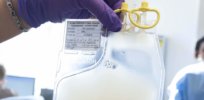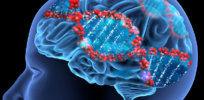Time

Kate Middleton’s cancer disclosure underscores troubling rise of disease in younger adults
Cancer is mostly diagnosed in those over 65 and in the U.S., only about 12% of cancers are diagnosed among ...

Viewpoint: Some Republican-governed states want to ban or limit sales of cell-cultivated meat. Here’s why that’s a bad idea
At the end of January, Florida’s House and the Senate Agriculture Committee approved a bill introduced by Republican Rep. Danny ...

Genetically modified pigs livers could save human lives. Here’s how
Organ transplants save lives, but specimens from the right donors are in short supply, and scientists are searching for more ...

Just 27% of Americans think genetically modified foods are safe to eat. It’s time to set the record straight
Thirty years after tomatoes became the first genetically modified produce sold in the U.S., lots of people remain skeptical of science-ified ...

The world is quickly getting too hot for human bodies. Can we adapt to rapid climate change?
By the time Homo erectus appeared about two million years ago, our ancestors were on their way to becoming endurance ...

Climate-induced ketchup shortage? How AI and other advanced technologies are helping farmers navigate global warming
Three summers’ worth of unprecedented high heat in the world’s key tomato-producing regions—Australia, Spain, and California’s central valley—have led to ...

What might dogs eat in a post-meat era ushered in by climate change?
As managing director of British startup Yora Pet Foods, Rankin’s job is figuring out how to lure dogs — or ...

Poor cholesterol? A gene-edited solution could lower ‘bad’ LDL and reduce heart disease risk
While a poor diet, stress, lack of exercise, and other lifestyle factors can lead to cholesterol problems, genetic factors also ...

China’s ‘future foods’: Lab grown meat and plant-based eggs on 5-year plan food and agriculture policy table
China’s Ministry of Agriculture and Rural Affairs has set the lab-grown meat industry abuzz with the release of its official five-year agricultural plan ...

Famed Israeli food critic was challenged to a taste test to choose between cell-grown and natural chicken. Here’s what happened
Renowned Israeli gastronome Michal Ansky knows her food. She’s a professional taster and a Master Chef judge. So when she was invited ...

Lab-grown fish can help protect our oceans — but does it taste good?
While lab-grown beef might help offset carbon emissions and reduce animal cruelty, the rollout of cell-based fish protein, shellfish and ...

Viewpoint: ‘Digital version of snake-oil salesmen’ — Vaccine hesitant ‘Frontline Doctors’ group charging up to $700 for inexpensive ivermectin treatments
Over the past three months, a TIME investigation found, hundreds of AFLD [America’s Frontline Doctors] customers and donors have accused ...

VaxTeen: Teenagers are learning how to circumvent their parents’ opposition to COVID vaccines
Among minors, 38% of 16- to 17-year-olds and 25% of 12- to 15-year-olds were fully vaccinated as of July 14, ...

‘We’ve been seeing viral evolution happen in front of our eyes’: How studying COVID genetics is revolutionizing medicine
“We have basically been seeing viral evolution happen in front of our eyes for the past year and a half,” ...

The smartest person in the cockpit: How Artificial Intelligence is guiding the emerging travel boom
A storm cell near Oklahoma City was likely to turn into a thunderstorm around the time Flight 1405 took off, ...

GM crops, edible insects will boost global sustainability, UN chief agriculture scientist says
On the side-lines of the UN’s 2021 Climate Adaptation Summit, TIME speaks with Agnes Kalibata, the Rwandan-born agricultural scientist and ...

Harvard and Stanford business schools pursue different – but equally successful – strategies to contain COVID on campus
Two elite programs, two wildly different approaches in tone and execution. In terms of the substance of their efforts, though, ...

Lessons from the 1918 Spanish flu: How does a pandemic end?
[I]n order for a pandemic to end, the disease in question has to reach a point at which it is ...

Cases of COVID-19 reinfection reported. Does that shatter immunity hopes?
Troubling headlines have been cropping up across Asia: Some patients in China, Japan and South Korea who were diagnosed with ...

Online DNA tests: How can we sort the rubbish from the real science?
The landscape of the consumer genomics market now would have been barely recognizable a decade ago. One study by scholar ...

Zimbabwe lifts GMO corn import ban to avert famine amid worst drought in 40 years
Zimbabwe has quietly lifted a ban on imports of genetically modified corn for the first time in 12 years as ...

Vertical farms, lab-grown meat: The sustainable future of food, or ‘wishful thinking’?
Farmers have grown food in roughly the same way for thousands of years .... Now, entrepreneurs say they have a ...

People with more active brains have shorter lifespans, study suggests
There are many factors that influence how long somebody lives. Some, like their genes, are out of their control. Others, ...

CRISPR moves from the lab to human trials, targeting blindness, beta thalassemia and sickle cell anemia
It’s only been seven years since scientists first learned how to precisely and reliably splice the human genome using a ...

Viewpoint: 54 years later, DNA testing revealed my secret biological father
One evening in the winter of 2016, my husband mentioned that he was sending away for one of those commercial ...

Using DNA to reunite immigrant families shows why genetic screening ‘should be widely embraced’
As the U.S. government struggles to make good on its promise to reunite all 3,000 children and parents who were separated ...

Antidepressant matchmaker? Genetic test could help identify correct drugs faster
Depression is a complicated condition, and so are the people it affects. It’s often difficult — and can take months ...

Genetics may help us choose our friends
You may have more in common with your friends than you think, according to a new study published in Proceedings of the National ...

